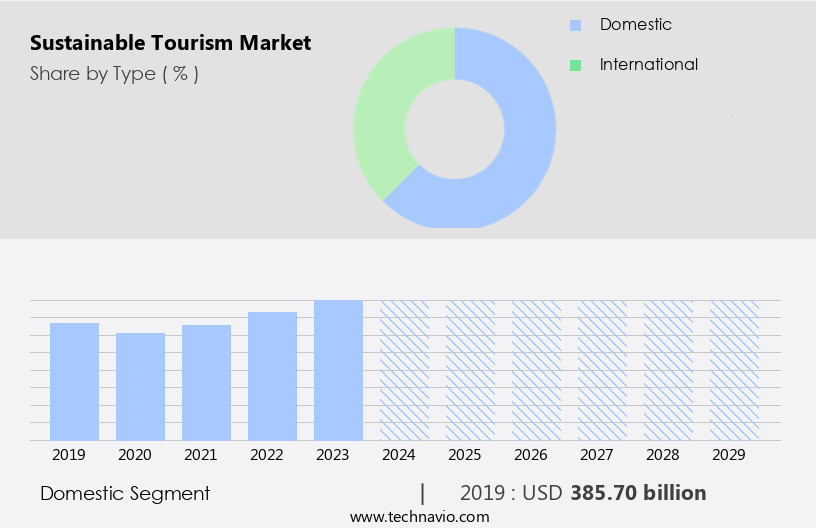Sustainable Tourism Market Size 2025-2029
The sustainable tourism market size is forecast to increase by USD 508.3 billion at a CAGR of 11.6% between 2024 and 2029.
- The market is experiencing significant growth, driven by the increasing number of eco-conscious travelers and the efforts of large tourism companies to adopt sustainable practices. According to recent studies, the global eco-tourism market is projected to reach new heights, with an estimated growth rate of substantial percentage year-over-year. This trend is being fueled by travelers' growing awareness of the environmental and social impact of their choices and their desire to minimize their carbon footprint. However, the market's growth is not without challenges. Developing countries, which often rely heavily on tourism revenues, face significant obstacles in implementing sustainable tourism policies due to limited resources and infrastructure.
- This creates a complex landscape for companies seeking to capitalize on market opportunities and navigate challenges effectively. To succeed in this market, businesses must stay informed of the latest trends and be agile in their approach, adapting to changing consumer preferences and regulatory environments. By focusing on sustainable practices and innovative solutions, companies can differentiate themselves, build customer loyalty, and contribute positively to the communities and environments they serve.
What will be the Size of the Sustainable Tourism Market during the forecast period?
- The market is experiencing significant growth as consumers increasingly prioritize eco-friendly travel options. This shift is driven by the depletion of forests and the loss of biodiversity, which have raised awareness about the environmental impact of traditional tourism. Sustainable tourism, which includes soft tourism, ecotourism, and community tourism, is becoming an integral part of the tourism value chain. Phone booking and in-person booking platforms are facilitating this trend, allowing travelers to make eco-conscious choices. Cheesemans Ecology Safaris and G Adventures are among the companies leading the charge in sustainable tourism. Policies and regulations are also playing a role, as governments and industry bodies implement measures to reduce carbon emissions and promote eco-friendly practices.
- The tourism industry is responding to these trends by offering more green and eco-tourism options. Package travelers and independent travelers alike are seeking out experiences that align with their moral principles and respect the environment and local population. Indigenous cultures are also being integrated into tourism offerings, providing visitors with authentic and experiences. Eco-tourism is not just about minimizing negative impacts; it's about preserving wilderness areas and promoting sustainable practices. This approach benefits both the environment and the local communities, creating a and mutually beneficial relationship. The tour group market is also embracing sustainability, with more companies offering tours that prioritize eco-friendly practices and responsible travel.
- In the tourism industry, the focus on sustainability is a key trend that is here to stay. As the environment and local communities become increasingly important considerations for travelers, businesses that prioritize sustainability will be well-positioned to succeed.
How is this Sustainable Tourism Industry segmented?
The sustainable tourism industry research report provides comprehensive data (region-wise segment analysis), with forecasts and estimates in "USD billion" for the period 2025-2029, as well as historical data from 2019-2023 for the following segments.
- Type
- Domestic
- International
- Channel
- Phone booking
- Online booking
- In-person booking
- Geography
- Europe
- France
- Germany
- Italy
- UK
- North America
- US
- Canada
- APAC
- China
- India
- Japan
- South America
- Brazil
- Middle East and Africa
- Europe
By Type Insights
The domestic segment is estimated to witness significant growth during the forecast period.
Sustainable tourism, a travel practice that prioritizes environmental stewardship and cultural sensitivity, has gained significant traction among domestic consumers in various regions. Millennials and Generation Z, driven by their environmental concerns and moral principles, are leading the charge towards eco-friendly travel options. Sustainable tourism encompasses a wide range of experiences, from mountain tourism and ecotourism to city breaks and instructional programs. Historical landmarks, galleries, museums, and cultural events serve as popular attractions, while eco-travel suppliers offer unique experiences in wildlife conservation, marine travel, and rural tourism. Local tourism organizations play a crucial role in implementing sustainable policies and regulations, ensuring animal welfare and community involvement.
Urban tourism and solo travelers also contribute to the market's growth, with the increasing popularity of soft tourism and group tourism. The depletion of forests and loss of biodiversity necessitate urgent action, leading to financial incentives, tax exemptions, and subsidies for eco-tourism and community tourism. Effective communication channels and CSR initiatives facilitate cross-cultural between visitors and the local population. Domestic sustainable tourism dominates the market due to the absence of currency exchange issues and the importance of regional economic growth. As the market evolves, tourism value chain players, including eco-travel suppliers, tourism organizations, and educational institutions, are collaborating on agreements and initiatives to promote sustainable practices and mitigate environmental deterioration.
Online booking platforms and in-person booking services offer eco-friendly travel options, making it easier for independent travelers and package travelers to make informed choices. The tourism industry's commitment to sustainability is not only a moral imperative but also a strategic business decision, as consumers increasingly demand responsible and ethical travel experiences.
Get a glance at the market report of share of various segments Request Free Sample
The Domestic segment was valued at USD 385.70 billion in 2019 and showed a gradual increase during the forecast period.
Regional Analysis
Europe is estimated to contribute 39% to the growth of the global market during the forecast period.Technavio’s analysts have elaborately explained the regional trends and drivers that shape the market during the forecast period.
For more insights on the market size of various regions, Request Free Sample
Sustainable tourism is a growing market trend, with consumer behavior increasingly favoring eco-friendly travel options. Millennials and Generation Z lead this shift, seeking authentic experiences that respect local cultures, wildlife, and natural resources. Sustainable tourism encompasses various sectors, including mountain tourism, ecotourism, city breaks, and marine travel. Eco-travel suppliers, tourism organizations, and educational institutions are responding to this demand, offering instructional programs, conservation initiatives, and community-based tourism. Policies and regulations play a crucial role in promoting sustainable practices, with governments setting targets to reduce carbon emissions and protect biodiversity. Laws and regulations cover various aspects, such as animal welfare, environmental management, and cultural preservation.
Communication channels, subsidies, and financial incentives are essential tools for promoting sustainable tourism. For instance, Invest India offers loans and grants to support eco-friendly projects. The tourism value chain, from independent travelers to package tourists and tour groups, benefits from these initiatives. Soft tourism, including visits to galleries, museums, and cultural events, is also gaining popularity. Urban tourism, rural travel, and island tourism are other emerging trends. Sustainable tourism's success hinges on the collaboration of various stakeholders, including tourism organizations, eco-travel suppliers, and the local population. Cross-cultural is essential for fostering positive relationships and minimizing environmental deterioration.
Online booking platforms and phone booking services facilitate eco-friendly travel options, making sustainable tourism more accessible to a wider audience. As the market evolves, it's essential to prioritize moral principles, such as respect for local communities and natural resources, to ensure the long-term sustainability of the industry.
Market Dynamics
Our researchers analyzed the data with 2024 as the base year, along with the key drivers, trends, and challenges. A holistic analysis of drivers will help companies refine their marketing strategies to gain a competitive advantage.
What are the key market drivers leading to the rise in the adoption of Sustainable Tourism Industry?
- Large tourism companies implementing sustainable tourism practices is the key driver of the market.
- Sustainability is a growing priority for many multinational hotels and tourism companies, including And Beyond, BOUTECO, Intrepid Group, Kind Traveler, Responsible Travel, and Wild Frontiers Adventure Travel. These organizations are collaborating to make their supply chains more sustainable, recognizing the far-reaching impact of their operations across various tourism sectors. Sustainable reporting has emerged as a standard practice among large travel and tourism operators, enabling them to focus on reducing their environmental footprint.
- This commitment to sustainability is expected to positively influence the market, as these companies and their suppliers wield significant influence in the industry. By working together to promote eco-friendly practices, they can help ensure a more sustainable future for tourism.
What are the market trends shaping the Sustainable Tourism Industry?
- Increase in eco-conscious travelers is the upcoming market trend.
- Sustainable tourism has gained increasing importance as travelers become more conscious of the environmental impact of their travels. This trend is driven by a growing awareness of the negative effects of tourism on natural resources and local communities. Sustainable tourism offers several benefits, including reducing environmental impact and fostering interactions with local communities. Various organizations, such as UNESCO, GSTC, and UNWTO, are at the forefront of promoting sustainable tourism practices.
- They provide guidance to tourism companies and destinations through training programs, accreditation schemes, conferences, and advocacy of sustainable tourism policies at different government levels. These efforts aim to ensure that tourism remains a beneficial and experience for both travelers and local communities.
What challenges does the Sustainable Tourism Industry face during its growth?
- Inability of developing countries to implement sustainable tourism policies is a key challenge affecting the industry growth.
- Sustainable tourism faces challenges in developing countries due to the inability to consistently implement policies that prioritize the conservation of natural resources, economic sustainability, and promotion of local heritage tours. For instance, Indonesia's national tourism law includes environmental conservation targets, but the lack of suitable action plans hinders effective implementation. India's lawmakers show increased awareness of sustainable tourism goals, but policy approval and implementation have been minimal.
- These factors pose a significant threat to the growth of the market, as governments and budgets can shift focus from sustainable practices. Despite these challenges, the importance of sustainable tourism in preserving cultural and natural heritage for future generations remains a crucial consideration for the industry.
Exclusive Customer Landscape
The sustainable tourism market forecasting report includes the adoption lifecycle of the market, covering from the innovator’s stage to the laggard’s stage. It focuses on adoption rates in different regions based on penetration. Furthermore, the sustainable tourism market report also includes key purchase criteria and drivers of price sensitivity to help companies evaluate and develop their market growth analysis strategies.
Customer Landscape
Key Companies & Market Insights
Companies are implementing various strategies, such as strategic alliances, sustainable tourism market forecast, partnerships, mergers and acquisitions, geographical expansion, and product/service launches, to enhance their presence in the industry.
Adventure Alternative Ltd. - The company specializes in eco-friendly travel experiences, including aviation adventures, wildlife safaris, educational excursions, and treks, promoting sustainable tourism practices. These journeys offer unique opportunities for personal growth and environmental awareness.
The industry research and growth report includes detailed analyses of the competitive landscape of the market and information about key companies, including:
- Adventure Alternative Ltd.
- And Beyond Holdings Proprietary Ltd.
- Aracari Travel
- Beyonder Experiences LLP
- BOUTECO Ltd.
- Earth Changers
- G Adventures
- Global Himalayan Expedition
- Intrepid Group Pty Ltd.
- Kind Traveler PBC
- Kynder LLC
- Mojosurf
- NATIVE TOURS INC.
- Responsible Travel
- Rickshaw Travel Ltd.
- Steppes Travel Ltd.
- The Blue Yonder
- Undiscovered Mountains Ltd.
- Wild Frontiers Adventure Travel Ltd.
- Wilderness Safaris
Qualitative and quantitative analysis of companies has been conducted to help clients understand the wider business environment as well as the strengths and weaknesses of key industry players. Data is qualitatively analyzed to categorize companies as pure play, category-focused, industry-focused, and diversified; it is quantitatively analyzed to categorize companies as dominant, leading, strong, tentative, and weak.
Research Analyst Overview
Sustainable tourism has emerged as a significant market trend, driven by the increasing awareness and concern for the environment among consumers. This shift in consumer behavior is particularly prominent among younger generations, including millennials and Generation Z, who prioritize experiences that align with their values and ethical principles. Outdoor sports and adventure activities have long been popular choices for travelers seeking authentic and eco-friendly experiences. Mountain tourism and ecotourism have gained popularity as visitors seek to explore natural landscapes while minimizing their impact on the environment. Eco-travel suppliers offer instructional programs and eco-friendly travel options, enabling travelers to learn about conservation efforts and engage in sustainable practices.
Historical landmarks and cultural sites are also popular destinations for sustainable tourism. Tourism organizations are implementing policies and regulations to ensure the preservation of these sites and the protection of local populations. Environmental concern is a key factor in the decision-making process for many travelers, leading to a growing demand for eco-friendly accommodations and transportation options. City breaks and urban tourism are also gaining traction in the market. Visitors are seeking authentic experiences that allow them to connect with local communities and learn about the history and culture of the destination. Museums and galleries offer educational opportunities, while cultural events provide unique experiences that showcase the rich diversity of different regions.
Wildlife tourism is another growing sector in sustainable tourism. Travelers are increasingly seeking opportunities to observe wildlife in their natural habitats while minimizing their impact on the animals and their environments. Animal welfare is a major concern, and many tourism organizations are implementing policies and regulations to ensure the ethical treatment of animals. Marine travel is also a popular choice for sustainable tourism. Coastal tourism and island hopping offer opportunities to explore unique ecosystems and learn about marine conservation efforts. Solo travelers and independent travelers are particularly drawn to these experiences, as they allow for a more personal and authentic connection with the destination.
Rural travel and eco-tourism are also gaining popularity, as travelers seek to explore off-the-beaten-path destinations and support local communities. Wilderness areas offer opportunities for adventure and exploration while minimizing the impact on natural resources. The market is complex and multifaceted, involving various entities and stakeholders. Tourism organizations, eco-travel suppliers, educational institutions, and government agencies all play a role in promoting and implementing sustainable practices. Financial incentives, such as tax exemptions, subsidies, and grants, are also important tools for encouraging sustainable tourism. Communication channels, including in-person booking and phone booking, are essential for connecting travelers with sustainable tourism options.
Online booking platforms have also become increasingly popular, offering a convenient and accessible way for travelers to plan their trips and make eco-friendly choices. The sustainable tourism value chain is evolving, with a growing emphasis on environmental management and community involvement. Agreements and initiatives between tourism organizations, local communities, and governments are crucial for ensuring the long-term sustainability of the industry. In , the market is driven by a growing awareness of environmental concerns and a desire for authentic and ethical travel experiences. Outdoor sports, historical landmarks, city breaks, wildlife tourism, and rural travel are all popular choices for sustainable travelers.
The involvement of various entities and stakeholders, including tourism organizations, eco-travel suppliers, educational institutions, and government agencies, is essential for promoting and implementing sustainable practices. Financial incentives and communication channels also play a crucial role in connecting travelers with sustainable tourism options.
|
Market Scope |
|
|
Report Coverage |
Details |
|
Page number |
194 |
|
Base year |
2024 |
|
Historic period |
2019-2023 |
|
Forecast period |
2025-2029 |
|
Growth momentum & CAGR |
Accelerate at a CAGR of 11.6% |
|
Market growth 2025-2029 |
USD 508.3 billion |
|
Market structure |
Fragmented |
|
YoY growth 2024-2025(%) |
10.1 |
|
Key countries |
US, France, Germany, UK, Canada, Japan, China, Italy, India, and Brazil |
|
Competitive landscape |
Leading Companies, Market Positioning of Companies, Competitive Strategies, and Industry Risks |
What are the Key Data Covered in this Sustainable Tourism Market Research and Growth Report?
- CAGR of the Sustainable Tourism industry during the forecast period
- Detailed information on factors that will drive the growth and forecasting between 2025 and 2029
- Precise estimation of the size of the market and its contribution of the industry in focus to the parent market
- Accurate predictions about upcoming growth and trends and changes in consumer behaviour
- Growth of the market across Europe, North America, APAC, South America, and Middle East and Africa
- Thorough analysis of the market’s competitive landscape and detailed information about companies
- Comprehensive analysis of factors that will challenge the sustainable tourism market growth of industry companies
We can help! Our analysts can customize this sustainable tourism market research report to meet your requirements.




